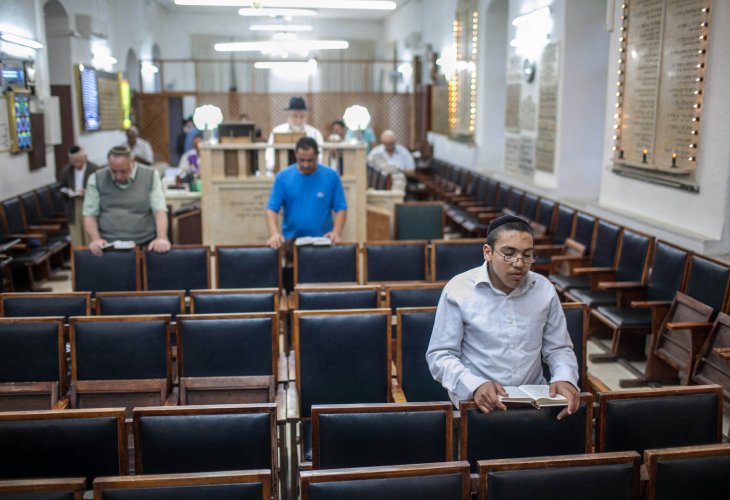Beginners Guide
The Importance of a Jew's Conduct in the Synagogue
Why do synagogues have signs saying "Do not talk during prayer," and why is this so strictly enforced?
 (Photo: Noam Moskowitz / Flash 90)
(Photo: Noam Moskowitz / Flash 90)Since the destruction of the Temple and the cessation of sacrificial offerings, prayer has served as a substitute for these offerings. Thus, synagogues are referred to as "Mikdash Me'at," or "small temples," as it is written, "I have been to them as a small sanctuary" (Ezekiel 11:16). The sages have interpreted this to mean "these are the synagogues and study houses" (Megillah 29a). For this reason, the synagogue is a sacred place, a house of Hashem, imbued with holiness and there is therefore an obligation to honor a synagogue, to treat it with reverence, and to fulfill "You shall fear My sanctuary" (Leviticus 19:30). The synagogue is where we meet with Hashem, and our conduct there should be of humility, reverence, and submission.
The 'Sefer HaChinuch' explains that the awe is not for the sanctuary itself but for the One who commanded the establishment of the sanctuary (Hashem). Similarly, it is written in 'Sefer Chassidim': "It is forbidden to engage in conversation or act with lightheadedness in the synagogue as we stand before our King, the Master of all the earth, blessed be His name. Woe to those who behave frivolously, who do not have the dread of the Almighty upon them, nor His fear and awe before them."
Talking during prayer represents a disrespect for the honor of Hashem, desecrating the sanctity, and even causes the prayers of other congregants who pray with intention not to be accepted by the Heavenly Court. Rabbi Jonathan Eybeschutz, in his book 'Ya'arot Dvash,' writes: "Those who speak in the synagogue create a cloud that prevents the prayers from ascending...not only does it harm themselves because their prayer is not accepted, but it also causes the entire congregation's prayers not to be accepted." The Maggid of Kozhnitz in his work 'Avodat Yisrael' adds: "One must be careful not to speak any idle words inside the synagogue except for prayer. Speaking idle talk during prayer is like someone conversing with the king and then turning his face away, saying: 'My lord, the king, I cannot speak with you now, I will speak my will and immediately return to speak with you;' this pushes away the divine presence, heaven forbid, and compromises the others who are praying with intention.
The 'Chatam Sofer' of blessed memory explained in one of his sermons regarding the prohibition of speaking in the synagogue that when worshippers talk during prayer, they cause the dismissal of the divine presence, and impurity prevails instead. The prince of impurity becomes the master, and all prayers align with impurity. Here are his words: "In His great mercy and kindness, Hashem left us a small sanctuary, synagogues, and study houses. If we treat them as holy, they bear the sanctity of the Land of Israel and the prayers ascend from them to the gates of heaven, but heaven forbid if we treat them with contempt and talk nonsense, this nonsense is impure, and the prince of impurity embodies them and he becomes the master of the synagogue, taking the prayers and directing them to the outer forces."
The holy Zohar contains particularly harsh words about those who speak during prayer. Here is the text (in translation): "He who speaks idle words in the synagogue... woe to him, for he has no part in the God of Israel, for he shows he has no god, that the God is not present in the synagogue, and he has no part in Him and does not fear Him, thereby disgracing the holy presence."
The Weekly Challenge
Save your social chats with friends from the synagogue for after the prayer.
 עברית
עברית

